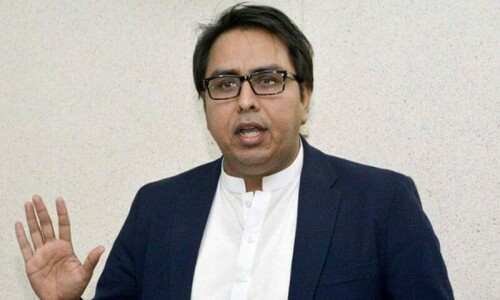
WASHINGTON, Sept 18: The United States and India should begin classified exchanges on multiple Pakistan contingencies, including the collapse of the Pakistan state and the spectre of the Pakistani military losing control of its nuclear arsenal, says a joint US-India study.
The 53-page report, co-sponsored by the US Council on Foreign Relations and the Aspen Institute India, urges New Delhi to open channels of communication with the Pakistan military while advising the United States to do everything possible to assist Pakistan in protecting its nuclear arsenal.
The study group, which aims to promote America’s relations with India, includes key US and Indian scholars and former officials such as Dennis C. Blair, former director of the US national intelligence; Richard Haas, CFR president and former director of policy planning at the State Department; Robert Blackwill, former US Ambassador to India; Brajesh Mishra, India’s former national security adviser; and principal secretary to Prime Minister A.B. Vajpayee and former Indian Ambassador to the US Naresh Chandra.
The report released this weekend, stresses the need for cooperation between the US and India on Pakistan and Afghanistan and underlines their concerns on Pakistan’s nuclear weapons.
“We developed … possible contingencies regarding developments in Pakistan,” the group’s co-chair, Ambassador Blackwill told the Foreign Policy magazine. “The report says the US strategy (of) using military and civilian assistance to try to persuade the Pakistan military to cease its support for terrorist groups that kill Indians and kill Americans in Afghanistan has failed.”
The report recommends that the United States “heavily condition, from now forward, military aid to Pakistan on the basis of Pakistan moving against these terrorist groups that target Americans and Indians.”
The study claims that Pakistan faces a systemic decline and that makes it very hard for either the United States or India to have an effective policy.
The report says that while the Pakistani military assures the world that its nuclear weapons are in safe hand, there are concerns that cannot be ignored.
“If the society at large becomes more chaotic, more violent, if Islamic extremists have more influence inside the country, then one has to worry whether at some point in which the Pakistan nuclear complex has been penetrated by terrorists or Islamic extremists of other persuasion,” says Mr Blackwill.
“The United States and India should be talking in a contingency way about what one country or the other might try to do in those circumstances. And what the two of them could try to do to prevent that from happening.”
Such discussions would be at a very high level between the United States and India and it would be absolutely crucial that they remained secret, Mr Blackwill adds.
On Afghanistan, the report recommends: “The United States and India should discuss whether large-scale Indian training of Afghan security forces, whether in Afghanistan or in India, would be beneficial.”
The study stresses that the United States should not permit Pakistan to have a de facto veto over the Indian relationship with Afghanistan. “We shouldn’t excite the Pakistani concerns unnecessarily, but we shouldn’t allow those concerns to veto Indian involvement in Afghanistan,” Mr Blackwill says. The report advises both the US and India to “assess very carefully” Pakistan’s possible reaction to India’s involvement in training Afghan security forces but it should not be ruled out prima facie simply because Pakistan wouldn’t like it.
The report suggests that “India’s leadership should develop channels, including military-to-military, to talk with the Pakistan military”.
Ambassador Chandra, the group’s other co-chair, backs the suggestion, noting that India is already dealing with the military in Myanmar while China too has a ‘heavy dose of military’ in the communist leadership. Another Indian member of the group, Raja Mohan, says that wisdom demands India’s engagement with the Pakistani military as the country’s civilian leadership is not in a position to deliver.















































